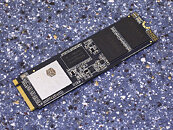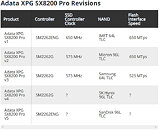- Joined
- Aug 19, 2017
- Messages
- 2,807 (1.02/day)
ADATA has recently been in a spot of controversy when it comes to their XPG SX8200 Pro solid-state drive (SSD). The company has reportedly shipped many different configurations of the SSD with different drive controller clock speeds and different NAND flash. According to the original report, ADATA has first shipped the SX8200 Pro SSD with Silicon Motion SM2262ENG SSD controller, running at 650 MHz with IMFT 64-layer TLC NAND Flash. However, it was later reported that the SSD was updated to use the Silicon Motion SM2262G SSD controller, clocked at 575 MHz. With this report, many users have gotten concerned and started to question the company's practices. However, ADATA later ensured everyone that performance is within the specifications and there is no need to worry.
Today, we have another report about the ADATA XPG SX8200 Pro SSD. According to a Redditor, ADATA has once again updated its SSD with a different kind of NAND Flash, however, this time the report indicated that performance was impacted. Tom's Hardware has made a table of changes showing as many as five revisions of the SSD, all with different configurations of SSD controllers and NAND Flash memory. We have contacted ADATA to clarify the issues that have emerged, and this is the official response that the company gave us.

For starters, you can take a look at the table made by Tom's Hardware, highlighting all the different revisions starting from V1 to V5.

SSD table of changes by Tom's Hardware
We have received detailed feedback from ADATA, and can now publish more information about the changes. First, the label of changes, from V1 to V5, is not chronological. The appearance of these versions has remained a bit weird. ADATA shipped V4 and V5, then followed by V2 and V3 during 2020. ADATA no longer shipped V4 and V5 after they have shipped V2 and V3, which makes sense. Since December 2020, the company has shipped V1 of SX8200 PRO 1 TB and 2 TB to the US market. As you can tell, there is data missing from the Tom's Hardware table. The information on V4 and V5 is too old. Additionally, sourcing 64-layer 3D TLC NAND chips is hard for any brand.
In our own review of the XPG SX8200 Pro SSD, we have tested the V1 version of the SSD. The V1 version that is shipping in 2020/2021 is still using the same controller, like our sample, which points towards a controller consistency here for at least the 1 TB+ models.
View at TechPowerUp Main Site
Today, we have another report about the ADATA XPG SX8200 Pro SSD. According to a Redditor, ADATA has once again updated its SSD with a different kind of NAND Flash, however, this time the report indicated that performance was impacted. Tom's Hardware has made a table of changes showing as many as five revisions of the SSD, all with different configurations of SSD controllers and NAND Flash memory. We have contacted ADATA to clarify the issues that have emerged, and this is the official response that the company gave us.

For starters, you can take a look at the table made by Tom's Hardware, highlighting all the different revisions starting from V1 to V5.

SSD table of changes by Tom's Hardware
We have received detailed feedback from ADATA, and can now publish more information about the changes. First, the label of changes, from V1 to V5, is not chronological. The appearance of these versions has remained a bit weird. ADATA shipped V4 and V5, then followed by V2 and V3 during 2020. ADATA no longer shipped V4 and V5 after they have shipped V2 and V3, which makes sense. Since December 2020, the company has shipped V1 of SX8200 PRO 1 TB and 2 TB to the US market. As you can tell, there is data missing from the Tom's Hardware table. The information on V4 and V5 is too old. Additionally, sourcing 64-layer 3D TLC NAND chips is hard for any brand.
In our own review of the XPG SX8200 Pro SSD, we have tested the V1 version of the SSD. The V1 version that is shipping in 2020/2021 is still using the same controller, like our sample, which points towards a controller consistency here for at least the 1 TB+ models.
View at TechPowerUp Main Site








